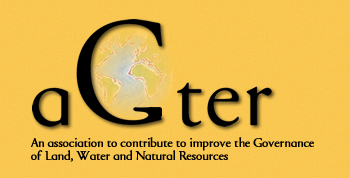|
|
|||||||||||||||
|
|
Those articles are now available on the Knowledge Base on Natural Resources Governance around the World. This new multilingual website, www.agter.org, has been built to offer an easy access to many documents in several languages. Subsection(s):
Monique Chemillier - Gendreau, international lawyer, gives her analysis of the global health crisis brought on by the Covid-19 epidemic as a consequence of a lack of democratic political organisation on all levels. She links it primarily to the damage caused to the environment by the transforming of natural and agricultural spaces into artificial environments, and the increased amount of capitalist exploitation of natural resources. She details her thoughts on a global political and judicial landscape that would warn us against any breaches to public interest and would guarantee its security.
In the early nineties when I was writing my PHD dissertation and struggling with dozens of field notes and types about Mayan forest Communities of the Yucatan peninsula, somebody handed me a book I read within few days and have written many times ever since. What was new and valuable about “Governing the Commons” in those days of combined disenchantment and nostalgia towards big theories and utopias? Certainly a new sense of coherence and understanding of social processes that did not derived (...)
In January 2012, The United Nations elaborated, on the basis of the submissions transmitted in autumn by governments, the “zero draft”, which was the starting point for the coming negotiations in the perspective of a Final Declaration at Rio+20. Thanks to the experience of 20 years of reflection and action with its partners on sustainable development, The Foundation Charles Léopold Mayer for the Progress of Humankind (FPH), has taken the initiative to write an “alternative zero draft” (AZD). (...)
Conflicts related to land and natural resources’ management have a long history in Nicaragua, a country where low levels of productivity per agricultural surface unit exist since soil and water utilization by big farmers are following extensive and predator patterns. In Nicaragua, half of the farmers do not own their land or own small and low quality plots. Inappropriate land use, poor access to it and the lack of articulation between national land policies and local land rights practices (...)
All along the book « la Démocratie en miettes », we can find a definition of governance, term that appears to be as well a concept than a analytical framework allowing to change our mind. Nevertheless, Pierre Calame does not reduce governance to one single definition. According to the author, fitting governance in history and a long term process is the first stake. From this point, some principles allow us to both understand better and implement a governance adapted to 21st century (...)
The active subsidiarity principle allowed us to understand in particular how different levels of governance communicate and cooperate with each other. Among these governing levels, the local territory represents the place where we can concretely identify both the acting individuals, the occurrence of the problems as well as their effect. Far from being an abstract and subsidiary environment, it is the typical place where relations between the actors involved and different ranks of (...)
The distinction between different types of goods offers a privileged field of application of the interpretative framework of governance in view of the evolution of today’s society. The binary pattern according to which there would be from one side the public goods, and to the other the private or traders’ goods, does not stand up to the analysis. By the yardstick of the trilogy put forward by the interpretative framework of the governance - " objectives, ethical criteria and work devices "-, (...) |
|||||||||||||||||||||||||||||
AGTER. Addres: 45 bis, avenue de la Belle Gabrielle, 94736 NOGENT SUR MARNE CEDEX, FRANCE
Telephone: +33(0)1 43 94 72 59 / +33(0)1 43 94 72 96
E-mail: agter@agter.org




